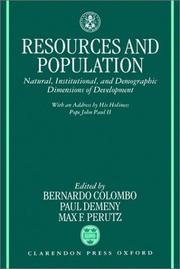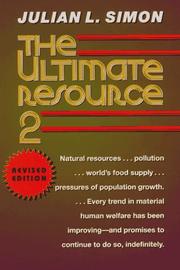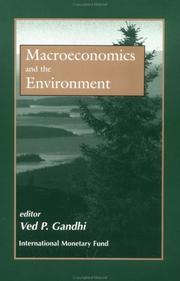| Listing 1 - 7 of 7 |
Sort by
|

ISBN: 0198289189 Year: 1996 Publisher: Oxford Clarendon
Abstract | Keywords | Export | Availability | Bookmark
 Loading...
Loading...Choose an application
- Reference Manager
- EndNote
- RefWorks (Direct export to RefWorks)
Economic conditions. Economic development
---
Demography
---
Economic development
---
-Natural resources
---
-Population
---
-#BIBC:ruil

ISBN: 030645338X 1475789963 1475789947 9780306453380 Year: 1996 Volume: *1 Publisher: New York: Plenum,
Abstract | Keywords | Export | Availability | Bookmark
 Loading...
Loading...Choose an application
- Reference Manager
- EndNote
- RefWorks (Direct export to RefWorks)
Demography --- Population --- Miscellanea --- -Demography --- -#SBIB:004.AANKOOP --- #SBIB:314H210 --- Historical demography --- Social sciences --- Vital statistics --- Human population --- Human populations --- Population growth --- Populations, Human --- Economics --- Human ecology --- Sociology --- Malthusianism --- Demografie: algemeenheden --- Miscellanea. --- Population - Miscellanea. --- Demography - Miscellanea. --- #SBIB:004.AANKOOP --- Population - Miscellanea --- Demography - Miscellanea

ISBN: 0226702235 0226702227 9786612679223 0226702219 1282679228 9780226702216 9780226702223 9780226702230 9781282679221 6612679220 Year: 1996 Publisher: Chicago University of Chicago press
Abstract | Keywords | Export | Availability | Bookmark
 Loading...
Loading...Choose an application
- Reference Manager
- EndNote
- RefWorks (Direct export to RefWorks)
In an era when many decry the failures of federal housing programs, this book introduces us to appealing but largely forgotten alternatives that existed when federal policies were first defined in the New Deal. Led by Catherine Bauer, supporters of the modern housing initiative argued that government should emphasize non-commercial development of imaginatively designed compact neighborhoods with extensive parks and social services. The book explores the question of how Americans might have responded to this option through case studies of experimental developments in Philadelphia and New York. While defeated during the 1930's, modern housing ideas suggest a variety of design and financial strategies that could contribute to solving the housing problems of our own time.
Housing policy --- New Deal, 1933-1939. --- History --- New Deal, 1933-1939 --- Housing --- Housing and state --- State and housing --- Government policy --- City planning --- Social policy --- federal housing, poverty, new deal, development, neighborhood, community, parks, social services, government, assistance, welfare, aid, philadelphia, depression, catherine bauer, politics, history, economics, pwa, hosiery workers, houses, harlem river, nonfiction, urban, city, population, growth, environment, green space, family, labor.

ISBN: 2707125555 9782707125552 Year: 1996 Publisher: Paris: La Découverte,
Abstract | Keywords | Export | Availability | Bookmark
 Loading...
Loading...Choose an application
- Reference Manager
- EndNote
- RefWorks (Direct export to RefWorks)
Demography --- Population --- Démographie --- Economic aspects --- Aspect économique --- Quality of Life --- -Quality of life --- 314 --- 312 --- 314.7 --- #SBIB:314H110 --- #SBIB:314H210 --- Life, Quality of --- Economic history --- Human ecology --- Life --- Social history --- Basic needs --- Human comfort --- Social accounting --- Work-life balance --- Human population --- Human populations --- Population growth --- Populations, Human --- Economics --- Sociology --- Malthusianism --- demografie - bevolkingsstatistieken --- Bevolkingsstudies en theorieën: algemeen --- Demografie: algemeenheden --- Quality of life. --- Economic aspects. --- Démographie --- Aspect économique --- Quality of life --- Population - Economic aspects
Book
ISBN: 271783057X 9782717830576 Year: 1996 Publisher: Paris: Economica,
Abstract | Keywords | Export | Availability | Bookmark
 Loading...
Loading...Choose an application
- Reference Manager
- EndNote
- RefWorks (Direct export to RefWorks)
Population --- Population forecasting --- Prévision démographique --- Overpopulation. --- Population. --- 314.82 --- Overpopulation --- AA / International- internationaal --- 311.0 --- 331.068 --- Human population --- Human populations --- Population growth --- Populations, Human --- Economics --- Human ecology --- Sociology --- Demography --- Malthusianism --- Population explosion --- Bevolkingstoename. Bevolkingsaanwas. Bevolkingsgroei --- Demografie. Algemene fenomenen: algemeenheden. --- Futurologie. --- 314.82 Bevolkingstoename. Bevolkingsaanwas. Bevolkingsgroei --- Prévision démographique --- Demografie. Algemene fenomenen: algemeenheden --- Futurologie --- 936 --- écologie politique --- démographie --- population --- hedendaagse wereld na 1945 --- temps contemporains après 1945

ISBN: 0691042691 0691003815 069121476X Year: 1996 Publisher: Princton, NJ Princeton University Press
Abstract | Keywords | Export | Availability | Bookmark
 Loading...
Loading...Choose an application
- Reference Manager
- EndNote
- RefWorks (Direct export to RefWorks)
Arguing that the ultimate resource is the human imagination coupled to the human spirit, Julian Simon led a vigorous challenge to conventional beliefs about scarcity of energy and natural resources, pollution of the environment, the effects of immigration, and the "perils of overpopulation." The comprehensive data, careful quantitative research, and economic logic contained in the first edition of The Ultimate Resource questioned widely held professional judgments about the threat of overpopulation, and Simon's celebrated bet with Paul Ehrlich about resource prices in the 1980s enhanced the public attention--both pro and con--that greeted this controversial book. Now Princeton University Press presents a revised and expanded edition of The Ultimate Resource. The new volume is thoroughly updated and provides a concise theory for the observed trends: Population growth and increased income put pressure on supplies of resources. This increases prices, which provides opportunity and incentive for innovation. Eventually the innovative responses are so successful that prices end up below what they were before the shortages occurred. The book also tackles timely issues such as the supposed rate of species extinction, the "vanishing farmland crisis," and the wastefulness of coercive recycling. In Simon's view, the key factor in natural and world economic growth is our capacity for the creation of new ideas and contributions to knowledge. The more people alive who can be trained to help solve the problems that confront us, the faster we can remove obstacles, and the greater the economic inheritance we shall bequeath to our descendants. In conjunction with the size of the educated population, the key constraint on human progress is the nature of the economic-political system: talented people need economic freedom and security to bring their talents to fruition.
Bevolking --- Economic nationalism --- Economic planning --- Economic policy --- Economisch beleid --- Economische politiek --- Hulpbronnen [Natuurlijke ] --- National planning --- National resources --- Natural resources --- Natural resources--Economic aspects --- Natuurlijke hulpbronnen --- Politiek [Economische ] --- Politique économique --- Population --- Resources [Natural ] --- Ressources naturelles --- State planning --- 330.59 --- 330.5 --- Human population --- Human populations --- Population growth --- Populations, Human --- Economics --- Human ecology --- Sociology --- Demography --- Malthusianism --- Resources, Natural --- Resource-based communities --- Resource curse --- Planning --- National security --- Social policy --- Levensstandaard. Sociale indicatoren --- Volksvermogen. Gemeenschappelijk produkt --- Economic aspects --- Economic policy. --- Natural resources. --- Population. --- 330.5 Volksvermogen. Gemeenschappelijk produkt --- 330.59 Levensstandaard. Sociale indicatoren --- Wirtschaftspolitik. --- Umweltschutz. --- Nutzung. --- Natürliche Ressourcen. --- Bevölkerungswachstum. --- Aufsatzsammlung. --- Chicago. --- Industrial Revolution. --- Ireland. --- Los Angeles. --- Mandeville, Bernard. --- PCBs. --- accidental deaths. --- agricultural capital. --- biologists. --- budget deficits. --- capital investments. --- chlorofluorocarbons. --- coliform bacteria. --- cosmic resources. --- crop oils. --- desert reclamation. --- emergency disaster relief. --- endangered species. --- energy accounting. --- fetuses. --- finiteness. --- hydroponics. --- infrastructure. --- international trade. --- light bulbs. --- middle classes. --- nitrogen oxides. --- nuclear fission. --- paper industry. --- physical laws. --- polychlorobiphenyls. --- racism. --- scarcity. --- vegetable farming. --- Bevölkerung --- Bevölkerungszunahme --- Wachstum --- Bevölkerungsentwicklung --- Naturgüter --- Naturschätze --- Naturressourcen --- Natürliche Ressource --- Naturpotential --- Ressourcen --- Erschöpfbare Ressourcen --- Rohstoff --- Benutzung --- Ökologie --- Umweltvorsorge --- Naturschutz --- Umweltkrise --- Umweltschaden --- Umweltverschmutzung --- Umweltschützer --- Umweltethik --- Volkswirtschaftspolitik --- Allgemeine Wirtschaftspolitik --- Politik --- Political aspects

ISBN: 1557755361 1462346189 1455211435 Year: 1996 Publisher: Washington, D.C. : International Monetary Fund,
Abstract | Keywords | Export | Availability | Bookmark
 Loading...
Loading...Choose an application
- Reference Manager
- EndNote
- RefWorks (Direct export to RefWorks)
Microeconomic policies, dealing with individual industries and economic sectors, have traditionally addressed environmental concerns, but increasingly the environment is being viewed in terms of the macro economy. To improve its understanding of the interrelationship between macroeconomics and the environment, the IMF held a seminar in May 1995 at which recognized experts from academic and research institutions, nongovernmental organizations, and staff from the World Bank and the IMF shared their views on how macroeconomic policies affect the environment and how environmental policies affect the macro economy. The present volume, edited by Ved P. Gandhi, contains the papers and proceedings of this seminar.
Economic policy --- Environmental economics --- Macroeconomics --- 330.362 --- 336.748.8 IMF --- 614.7 --- 330.00 --- 339.0 --- 351.2 --- 355 --- AA / International- internationaal --- 330.101 --- 338.22 --- 338.22 Economische organisatieleer. Economisch beleid. Economische politiek --- Economische organisatieleer. Economisch beleid. Economische politiek --- Economic nationalism --- Economic planning --- National planning --- State planning --- Economics --- Planning --- National security --- Social policy --- 330.101 Economische analyse. Economische methodologie. Economische onderzoeksmethoden--(theoretische economie) --- Economische analyse. Economische methodologie. Economische onderzoeksmethoden--(theoretische economie) --- Congresses --- macro economie - macro economisch evenwicht --- Internationaal Monetair Fonds - IMF --- milieu - leefmilieu - milieubeleid (zie ook 712) - duurzame ontwikkeling --- Economische en sociale theorieën: algemeenheden --- Algemeenheden. Nationale rekeningen --- Openbare gezondheid. Milieubescherming. Milieuvervuiling --- Milieu --- Pollutie van lucht, water, grond--(openbare gezondheidszorg) --- International finance --- Environmental protection. Environmental technology --- Congresses. --- Environmental Economics --- Environmental Conservation and Protection --- Natural Resources --- Environmental Policy --- Environmental Economics: General --- Agricultural and Natural Resource Economics --- Environmental and Ecological Economics: General --- Environmental Economics: Government Policy --- General Aggregative Models: General --- Macroeconomics: Consumption --- Saving --- Wealth --- Environment and Development --- Environment and Trade --- Sustainability --- Environmental Accounts and Accounting --- Environmental Equity --- Population Growth --- Environmental management --- Environmental policy & protocols --- Public finance & taxation --- Conservation of the environment --- Environment --- Natural resources --- Environmental policy --- National accounts --- Consumption --- Environmental sustainability --- Environmental sciences --- National income --- Sustainable development --- Norway
| Listing 1 - 7 of 7 |
Sort by
|

 Search
Search Feedback
Feedback About UniCat
About UniCat  Help
Help News
News